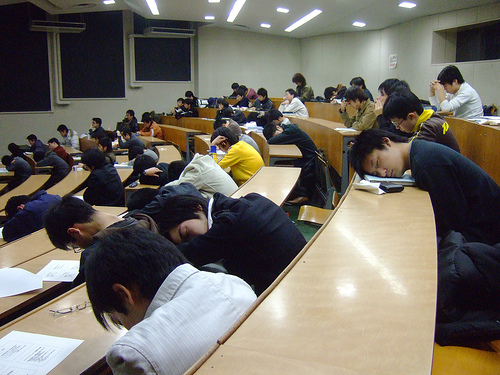I read with interest today an article in the MPR News site by Eric Westervelt entitled "This educator says it's time to ditch the college lecture". It refers to Nobel Laureate Carl Wieman who tells us that the traditional lecture is "long overdue for revision" - largely on the grounds that students learn very little from a lecture. He bemoans teaching standards in the third level education environment that is "obsessed with publishing and research funding, which remain the bedrock of tenure and promotion".
 |
| Image Source: https://aonewayticket.wordpress.com |
Wieman eschews the traditional lecture in favour of mini-lectures mixed with problem-solving sessions where students are divided up into groups and given a problem to think about and discuss. He calls this "Active Learning" - he teaches quantum mechanics. He says that his mini-lectures are "merely to prime the undergrads to grapple with the concepts and key questions on their own and try to figure out what's important — or not". He is quoted as saying: "I know you can double how much a student learns depending on what method the instructor is using". This all sounds very familiar to me - I do this in many of my classes. I am more than aware that students' attention span is short - I quite often will get students to start on a problem after only 5 or 10 minutes of a lecture. My practice is to mix tutorials and lectures where possible so that students are doing practical work as much as possible. I also do this because I too get bored with a long lecture! Sometimes in a statistics class I will get the students to perform a test in R or SPSS first, and then explain it afterwards! Having done the test, it takes less time to explain it, further reducing the need for a long lecture.
Problem-based learning has been around for a long time - in my experience students hate it. Active learning is bit different and has been adopted by some colleges (eg Stanford) who report that the results were "striking" and that students in the active learning sections did "substantially better than the students in the traditionally taught classes on all common exams". There is still road-blocks to this as an education path for Colleges - the insistence on being measured by research performance rather than teaching performance is the biggest obstacle. For my part I am not an active researcher so I can look at ways to improve my teaching. Given Carl Wieman's thoughts and success in this area I just might follow suit.
Then why Oh No? I'm confused. btw, did you mean NPR?
ReplyDeleteThe weird thing is that 'most science faculty are not just standing in front of their classes talking all the time*'. Active learning is common and something covered for many years in higher ed teaching courses, but there is still some journalistic mileage in claiming that only a few enlightened peers are doing it.
ReplyDeletehttps://dynamicecology.wordpress.com/2016/04/20/how-much-do-scientists-lecture-and-why-poll-results-and-commentary/#more-20127